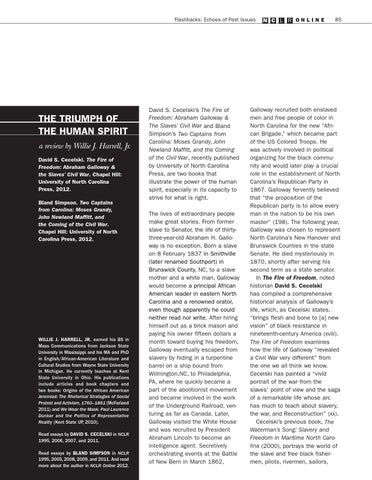Flashbacks: Echoes of Past Issues
The triumph of the Human Spirit a review by Willie J. Harrell, Jr. David S. Cecelski. The Fire of Freedom: Abraham Galloway & the Slaves’ Civil War. Chapel Hill: University of North Carolina Press, 2012. Bland Simpson. Two Captains from Carolina: Moses Grandy, John Newland Maffitt, and the Coming of the Civil War. Chapel Hill: University of North Carolina Press, 2012.
Willie J. Harrell, Jr. earned his BS in Mass Communications from Jackson State University in Mississippi and his MA and PhD in English/African-American Literature and Cultural Studies from Wayne State University in Michigan. He currently teaches at Kent State University in Ohio. His publications include articles and book chapters and two books: Origins of the African American Jeremiad: The Rhetorical Strategies of Social Protest and Activism, 1760–1861 (McFarland 2011) and We Wear the Mask: Paul Laurence Dunbar and the Politics of Representative Reality (Kent State UP, 2010). Read essays by David S. Cecelski in NCLR 1995, 2006, 2007, and 2011. Read essays by Bland Simpson in NCLR 1995, 2005, 2008, 2009, and 2011. And read more about the author in NCLR Online 2012.
David S. Cecelski’s The Fire of Freedom: Abraham Galloway & The Slaves’ Civil War and Bland Simpson’s Two Captains from Carolina: Moses Grandy, John Newland Maffitt, and the Coming of the Civil War, recently published by University of North Carolina Press, are two books that illustrate the power of the human spirit, especially in its capacity to strive for what is right. The lives of extraordinary people make great stories. From former slave to Senator, the life of thirtythree-year-old Abraham H. Galloway is no exception. Born a slave on 8 February 1837 in Smithville (later renamed Southport) in Brunswick County, NC, to a slave mother and a white man, Galloway would become a principal African American leader in eastern North Carolina and a renowned orator, even though apparently he could neither read nor write. After hiring himself out as a brick mason and paying his owner fifteen dollars a month toward buying his freedom, Galloway eventually escaped from slavery by hiding in a turpentine barrel on a ship bound from Wilmington,NC, to Philadelphia, PA, where he quickly became a part of the abolitionist movement and became involved in the work of the Underground Railroad, venturing as far as Canada. Later, Galloway visited the White House and was recruited by President Abraham Lincoln to become an intelligence agent. Secretively orchestrating events at the Battle of New Bern in March 1862,
N C L R ONLINE
85
Galloway recruited both enslaved men and free people of color in North Carolina for the new “African Brigade,” which became part of the US Colored Troops. He was actively involved in political organizing for the black community and would later play a crucial role in the establishment of North Carolina’s Republican Party in 1867. Galloway fervently believed that “the proposition of the Republican party is to allow every man in the nation to be his own master” (198). The following year, Galloway was chosen to represent North Carolina’s New Hanover and Brunswick Counties in the state Senate. He died mysteriously in 1870, shortly after serving his second term as a state senator. In The Fire of Freedom, noted historian David S. Cecelski has compiled a comprehensive historical analysis of Galloway’s life, which, as Cecelski states, “brings flesh and bone to [a] new vision” of black resistance in nineteenth-century America (xviii). The Fire of Freedom examines how the life of Galloway “revealed a Civil War very different” from the one we all think we know. Cecelski has painted a “vivid portrait of the war from the slaves’ point of view and the saga of a remarkable life whose arc has much to teach about slavery, the war, and Reconstruction” (xx). Cecelski’s previous book, The Waterman’s Song: Slavery and Freedom in Maritime North Carolina (2000), portrays the world of the slave and free black fishermen, pilots, rivermen, sailors,
